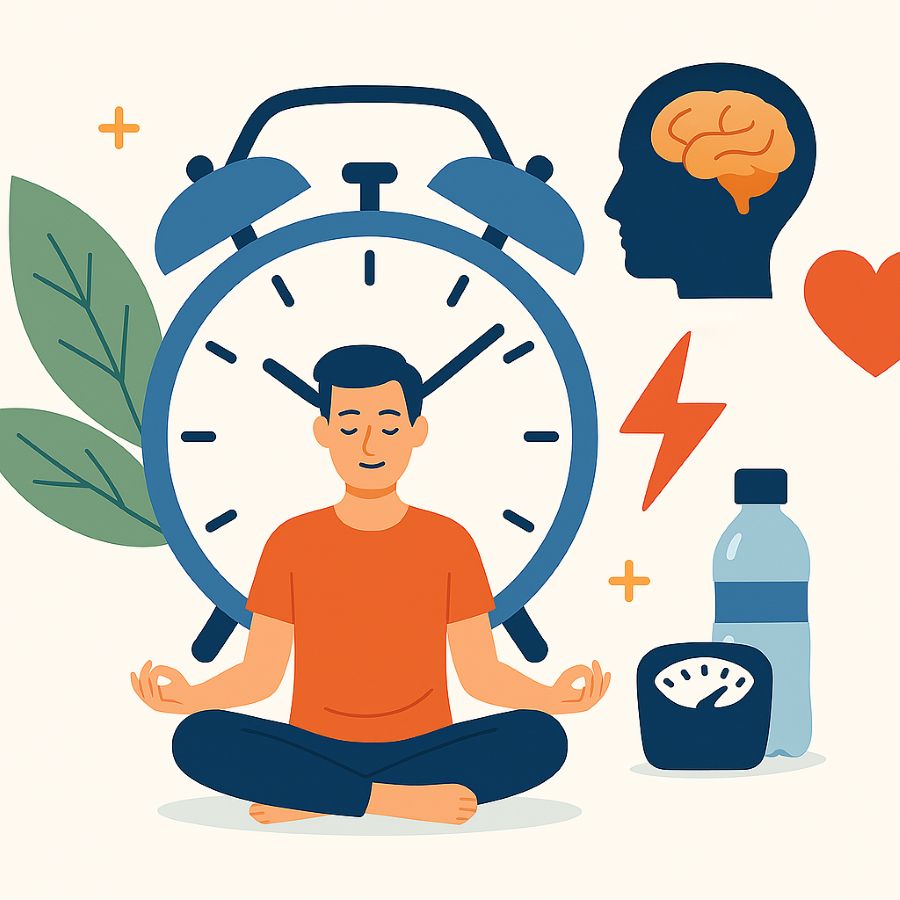Hey there, health enthusiasts! If you’ve ever wondered whether fasting could do more than just help with weight loss, you’re in for a treat. Today, we’re diving deep into the fascinating world of fasting benefits for mental health. Fasting isn’t just a trendy diet hack; it’s a practice rooted in centuries of tradition and, more recently, backed by science as a potential game-changer for your mind. From reducing stress to boosting brain function, the mental health perks of fasting are worth exploring. In this post, I’ll walk you through the science, share practical tips for incorporating fasting into your life, and explain why this ancient practice might just be the reset your mind needs. Let’s get started!
What Is Fasting, and How Does It Work?
Fasting, at its core, is the voluntary abstention from food and sometimes drink for a specific period. It’s been practiced for religious, cultural, and health reasons for thousands of years. Today, forms like intermittent fasting (IF), where you cycle between eating and fasting windows, or prolonged fasting, where you abstain for 24 hours or more, are gaining popularity for their health perks. But how do these fasting benefits translate to mental well-being? When you fast, your body shifts gears—moving from digesting food to repairing cells and burning stored energy. This metabolic switch can influence brain chemistry, hormone levels, and inflammation, all of which play a role in mental health (Mattson et al., 2018). It’s like giving your body and mind a chance to hit the reset button. Let’s explore how this works specifically for your mental state.
The Science Behind Fasting Benefits for Mental Health
Alright, let’s nerd out for a minute. The connection between fasting and mental health isn’t just anecdotal; there’s solid science backing it up. One of the key fasting benefits is its impact on brain-derived neurotrophic factor (BDNF), a protein that supports brain health. Studies show that fasting can increase BDNF levels, which may help protect against depression and anxiety by promoting neural growth and resilience (Mattson et al., 2018). Additionally, fasting triggers ketosis—a state where your body burns fat for fuel—producing ketones that have been linked to improved mood and cognitive clarity (Brietzke et al., 2018). Fasting also reduces inflammation, a known contributor to mental health disorders like depression (Burhani & Rasenick, 2020). These mechanisms suggest that fasting isn’t just about the body; it’s a powerful tool for the mind. But what does this look like in real life? Let’s break it down further.
Fasting and Stress Reduction: A Calmer Mind
Life can be a whirlwind, and chronic stress is a major player in mental health struggles. Here’s where the mental health advantages of fasting shine. Fasting has been shown to lower cortisol levels, the stress hormone that keeps us in fight-or-flight mode (Fond et al., 2013). When you fast, especially during intermittent fasting protocols, your body adapts by improving its stress response, making you feel more balanced over time. I’ve personally noticed that after a 16:8 fasting schedule (16 hours fasting, 8 hours eating), I’m less reactive to daily annoyances. It’s not magic—it’s biology! Plus, fasting can enhance mindfulness. When you’re not constantly snacking, you become more attuned to your body’s signals, which can ground you in the present moment. If stress is your nemesis, fasting might just be your secret weapon.
Boosting Cognitive Function Through Fasting
Ever feel like your brain is stuck in a fog? Fasting could help clear the haze. One of the standout fasting benefits is its ability to sharpen focus and improve cognitive function. Research suggests that fasting promotes autophagy, a cellular cleanup process that removes damaged cells and may protect against neurodegenerative diseases (Alirezaei et al., 2010). This “decluttering” can enhance memory and learning. On a personal note, I’ve found that skipping breakfast during a fasting window leaves me more alert for morning tasks. It’s like my brain gets a mini-upgrade! Fasting also stabilizes blood sugar levels, preventing the energy crashes that mess with concentration. If you’re looking to boost productivity, consider weaving fasting into your routine with these practical tips.
Practical Tips to Start Fasting for Mental Wellness
Convinced about the fasting benefits for mental health but not sure where to start? Don’t worry—I’ve got you covered. Fasting doesn’t have to be intimidating, and you don’t need to jump into a week-long fast right away. Here are some beginner-friendly ways to ease into it while keeping your mental well-being in focus:
- Start Small with Intermittent Fasting: Try the 16:8 method—fast for 16 hours (including sleep) and eat during an 8-hour window. It’s manageable and still offers mental clarity perks.
- Stay Hydrated: Drink plenty of water during fasting periods to avoid dehydration, which can worsen mood and focus.
- Listen to Your Body: If you feel dizzy or overly irritable, break your fast. Mental health comes first, so don’t push too hard.
- Pair Fasting with Mindfulness: Use fasting windows to meditate or journal, enhancing the stress-relief benefits.
- Break Your Fast Wisely: Opt for nutrient-dense foods like veggies and lean protein to support brain health post-fast.
Remember, consistency is key. Start with a few days a week and gradually build up as you get comfortable. Fasting is a personal journey, so tailor it to what feels right for you.
Potential Challenges and How to Overcome Them
Let’s keep it real—fasting isn’t always a walk in the park, especially when you’re aiming for those fasting benefits for mental health. Hunger pangs, irritability (hello, “hanger”), and social pressures can make it tricky. Early on, you might feel cranky as your body adjusts to new eating patterns. Research notes that these side effects often subside after a week or two as your body adapts (Johnstone, 2015). Here are some strategies to tackle common hurdles:
- Prepare for Hunger: Keep busy during fasting windows to distract yourself—read, walk, or tackle a project.
- Manage Social Situations: Plan fasting days around quieter times, or explain your goals to friends and family for support.
- Ease Mood Swings: If you’re feeling off, sip herbal tea or black coffee (no sugar) to curb cravings without breaking the fast.
- Consult a Professional: If you have a history of eating disorders or mental health conditions, talk to a doctor before starting.
Facing challenges is part of the process, but with a little planning, you can make fasting a sustainable tool for mental wellness. Don’t give up if the first few days feel tough—stick with it, and you might be surprised by the results.
So, what’s the takeaway from all this? Fasting isn’t just about shedding pounds or detoxing—it’s a powerful practice with profound fasting benefits for mental health. From reducing stress and anxiety to enhancing focus and cognitive function, the mental health advantages of fasting are backed by science and real-world experiences. Whether you’re new to fasting or a seasoned pro, incorporating it into your life with intention can lead to a calmer, clearer mind. Remember to start slow, stay hydrated, and prioritize your well-being above all. Have you tried fasting for mental health? I’d love to hear your story in the comments. Here’s to unlocking a healthier, happier you—one fast at a time!
References
- Alirezaei, M., Kemball, C. C., Flynn, C. T., Wood, M. R., Whitton, J. L., & Kiosses, W. B. (2010). Short-term fasting induces profound neuronal autophagy. Autophagy, 6(6), 702-710. https://doi.org/10.4161/auto.6.6.12376
- Brietzke, E., Mansur, R. B., Subramaniapillai, M., Balanzá-Martínez, V., Vinberg, M., González-Pinto, A., … & McIntyre, R. S. (2018). Ketogenic diet as a metabolic therapy for mood disorders: Evidence and developments. Neuroscience & Biobehavioral Reviews, 94, 11-16. https://doi.org/10.1016/j.neubiorev.2018.07.020
- Burhani, M. D., & Rasenick, M. M. (2020). Fish oil and depression: The skinny on fats. Journal of Integrative Neuroscience, 19(4), 739-748. https://doi.org/10.31083/j.jin.2020.04.388
- Fond, G., Macgregor, A., Leboyer, M., & Michalsen, A. (2013). Fasting in mood disorders: Neurobiology and effectiveness. A review of the literature. Psychiatry Research, 209(3), 253-258. https://doi.org/10.1016/j.psychres.2012.12.018
- Johnstone, A. (2015). Fasting for weight loss: An effective strategy or latest dieting trend? International Journal of Obesity, 39(5), 727-733. https://doi.org/10.1038/ijo.2014.214
- Mattson, M. P., Moehl, K., Ghena, N., Schmaedick, M., & Cheng, A. (2018). Intermittent metabolic switching, neuroplasticity and brain health. Nature Reviews Neuroscience, 19(2), 63-80. https://doi.org/10.1038/nrn.2017.156






